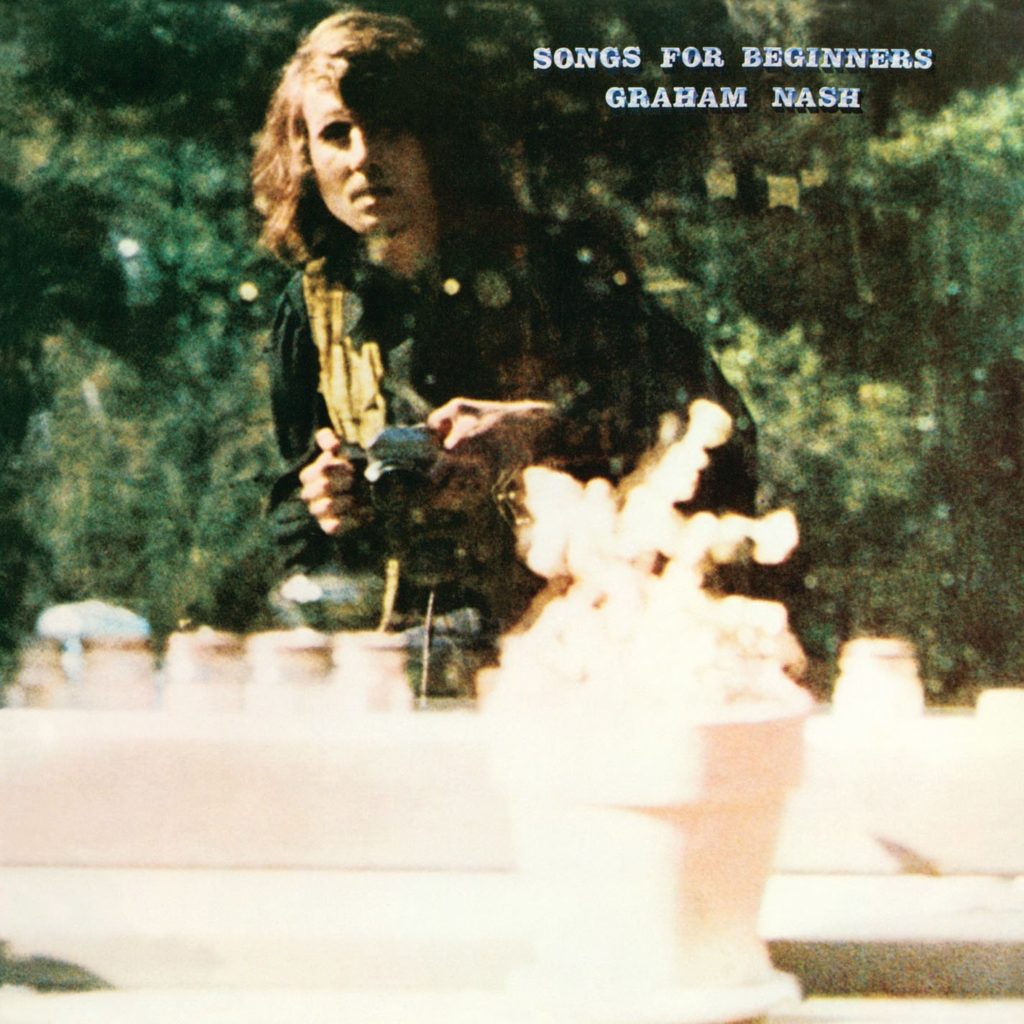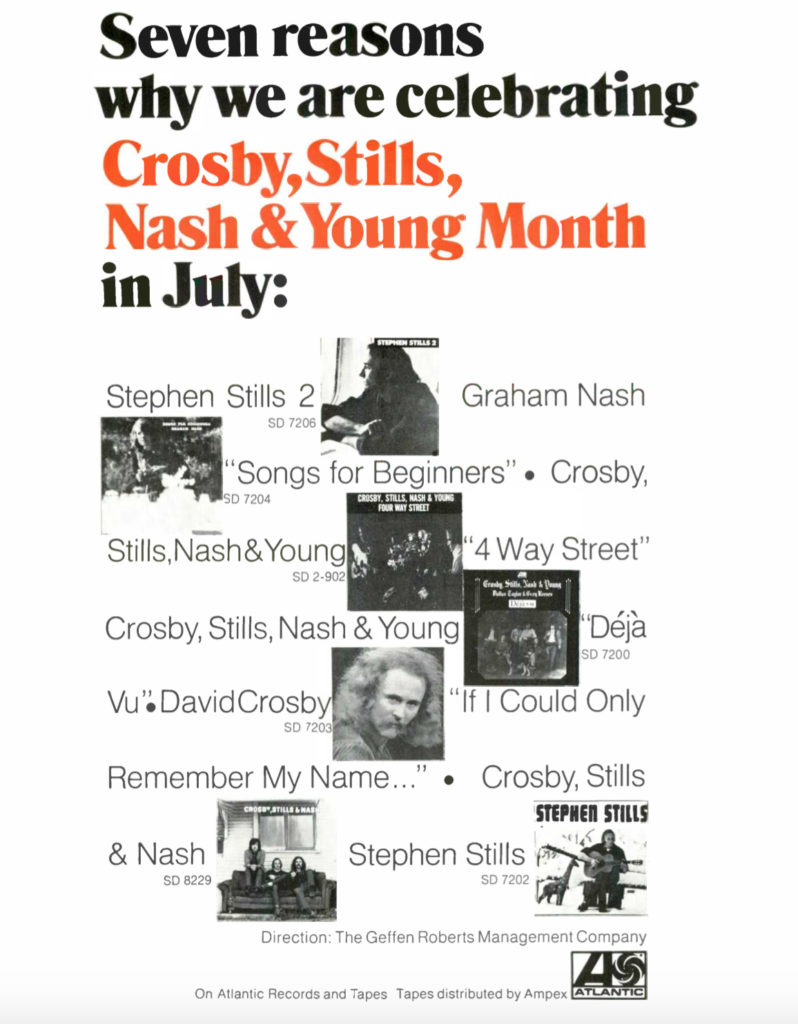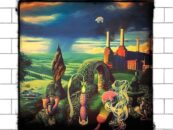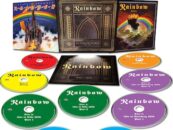 The period between the fall of 1970 and the summer of ’71 was an auspicious one for America’s prime supergroup, Crosby, Stills, Nash and Young. Although the quartet wouldn’t share a follow-up album to March ’70’s Déjà Vu for another 17 years—the sole exception being the live double album 4 Way Street that appeared in April of ’71—it was still a productive time. Each of the individual members released crucial solo albums within a year and a half of Déjà Vu’s arrival: Stephen Stills’ Stills 2, David Crosby’s first outing of his own, If I Could Only Remember My Name, Neil Young’s career-defining After the Gold Rush and Graham Nash’s initial individual offering, Songs for Beginners.
The period between the fall of 1970 and the summer of ’71 was an auspicious one for America’s prime supergroup, Crosby, Stills, Nash and Young. Although the quartet wouldn’t share a follow-up album to March ’70’s Déjà Vu for another 17 years—the sole exception being the live double album 4 Way Street that appeared in April of ’71—it was still a productive time. Each of the individual members released crucial solo albums within a year and a half of Déjà Vu’s arrival: Stephen Stills’ Stills 2, David Crosby’s first outing of his own, If I Could Only Remember My Name, Neil Young’s career-defining After the Gold Rush and Graham Nash’s initial individual offering, Songs for Beginners.
In many ways, Nash’s album, released on May 28, 1971, was the most anticipated effort of all. Stills and Young had proven their muster with earlier efforts, while Crosby’s previous behavior negated any great hope for significant achievement. Nash’s work, on the other hand, had heightened expectations, given a lengthy early résumé that included his tenure with the Hollies as one of the group’s chief singers, songwriters and original architects. After all, his high harmonies were an integral element in the band’s biggest songs—“On a Carousel,” “King Midas in Reverse” and “Carrie Anne,” to name but a few—and indeed, when he joined forces with Crosby and Stills, his songs and singing helped define the sound of that union as much as anything else brought to bear by his colleagues.
Given his signature style, he already had all the elements needed when it came to plotting his long-awaited outing. Not that he was going it alone; like his partners, Nash took a populist approach, inviting the same friends and fellow travelers that populated the prodigious post-’60s West Coast music scene: Jerry Garcia and Phil Lesh of the Grateful Dead, fellow expatriate Dave Mason, Jackson Browne accompanist David Lindley, his then-current paramour Rita Coolidge, and, of course, his erstwhile compadres Crosby and Young. Consequently, while Nash naturally takes center stage, any one of these songs could easily have found a fit in the CSNY repertoire. The highly charged anthem written in support of the so-called Chicago Eight, “Chicago” proved the point after making its debut on 4 Way Street the year before.
Listen to the demo of “Chicago”
And the final version of “Chicago”/”We Can Change the World”
Like the album’s lead-off track “Military Madness,” Nash’s autobiographical narrative on the futility of army conscription, “Chicago” was rooted in the antiwar stance that fully ignited within the band following the student killings at Kent State and the rush-release of their single “Ohio” in its immediate aftermath.
Given the song’s demonstrative delivery—it was originally intended as a plea to his bandmates to come to Chicago and do a benefit concert in support of the protestors—it’s ironic that Nash, an Englishman, would evolve as one of the band’s most fervent political cheerleaders. It’s also a bit of a twist in the fact that it actually attained a respectable placement within the top 40 of the influential Billboard singles chart, an unusual achievement given the insurgent subject matter.
Related: Graham Nash talks about his “lucky life”

Individually and collectively, Crosby, Stills, Nash & Young were all over the charts when Atlantic Records placed this ad in the July 10, 1971 issue of Record World
That said, the majority of the album could be considered an emotional salve of sorts, given that the songs were written in the immediate aftermath of Nash’s breakup with one-time lover and subject of the song “Our House,” Joni Mitchell. Indeed, Nash makes little attempt to hide his tattered emotions, especially as they’re reflected within such songs as “Better Days,” “Sleep Song” and “I Used To Be a King.” The latter is especially telling, a distraught attempt to reconcile his heartbreak with the serenity and security he thought he once attained: “I used to be a king and everything around me turned to gold/I thought I had everything and now I’m left without a hand to hold…” The lyric becomes even more explicit as Nash conveys his sentiments in the resolute yet remorseful chorus:
“And in my bed where are you
Someone is going to take my heart
But no one is going to break my heart again”
The feelings of heartbreak and happenstance morph into words of advice in the emotional thrust of the bittersweet ballad “Better Days,” in which Nash attempts to impart lessons learned into abject advice for others:
“When your love has moved away
You must face yourself and you must say
I remember better days
Don’t you cry ’cause she is gone
She is only moving on
Chasing mirrors through a haze”
That then takes on an even more pointed perspective in the revealing song that follows, tellingly titled “Wounded Bird.” An attempt to soothe a distraught Stephen Stills, whose relationship with Judy Collins was unraveling at the time, it shared another bit of wisdom: “humble pie is always hard to swallow with your pride.” Likewise, “Man in the Mirror” conveys a confessional sentiment in its unblemished balladry before erupting into the song’s compelling chorus.
That ability to share his vulnerability with naked candor may be the single most defining trait in Nash’s entire musical arsenal. “I believe I am quite a complicated, simple man,” he wrote in the descriptive liner notes to 2009’s Reflections anthology. Though it appears to be a contradiction in terms, it also exemplifies Nash’s ability to navigate the divide between desire and despair.
Watch Nash perform “Military Madness” during a recent tour
Nash’s solo recordings are available here. He’s touring in 2024; tickets are available here and here.






5 Comments so far
Jump into a conversationI bought this Nash album when it first came out and played it a lot. I really loved it. To come across it again so many years later I am very happy to hear these tracks – still exceedingly good – lyrics/music/vocals are great.
Great Great Great album!!!
One of my favorite albums; as noted by others here, great music, great lyrics, great instrumentals by a great band. What’s not to like?
Nash wasn’t the only expatriate in CSNY.
1971 I had the same take on this record that everyone had. I thought it was brilliant, but I was 15 years old. After not hearing it for a couple decades I played it once more and was dismayed that (to my ears anyway) it sounded like a good songwriter and very very good singer out of his mind on cocaine and singing like it. Last year’s release of Songs For Beginners and Wild Tales live was one of my biggest pleasant surprises in recent years. Total vindication of songs I already knew were top notch. I dont expect many to agree with me but I wanted to share my thoughts and experience with this record.